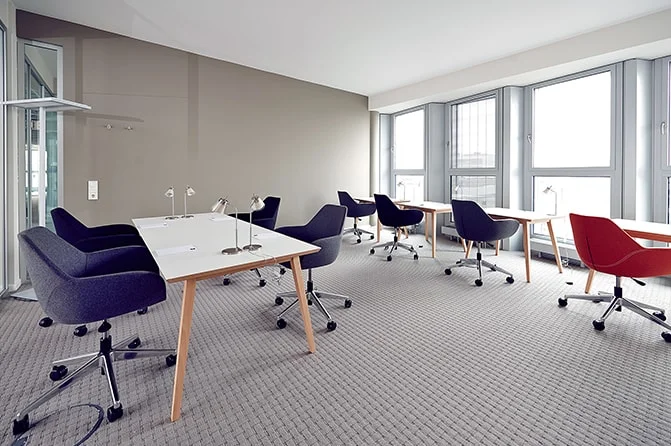Your Hamburg specialist for flexible office solutions, conference rooms, virtual offices & telephone service

They are the workplace of the future and offer more than just a desk: Modern office concepts are flexible workspaces that boost collaboration and creativity and reduce costs.
The classic executive, single and double offices are still in demand in today’s working world because they enable highly concentrated work. However, these office classics also have the highest costs due to an enormous space requirement and the communication paths are longer, which makes project work more difficult. Employees are often not at work for a full five days because they have customer appointments or work from home. With traditional office concepts, these workstations would remain unused during absences.
Modern office concepts, on the other hand, have adapted to the changes in everyday working life and offer office design tailored to requirements, which saves costs and facilitates collaboration. In my last blog post, I already explained how a business center can lower your costs. Here I will now introduce you to the contemporary office concepts that contribute to this in more detail.
The concept of the open-plan office is not new and enjoys great popularity in companies due to the effective space savings and short communication channels for intensive exchange. However, the large rooms in which 10 or more employees sit at their desks have the disadvantage that the noise level is high and thus concentrated work is disturbed by telephone calls, for example. The coming and going of colleagues is also distracting. All this makes open-plan offices not particularly popular with employees. With modern office concepts, however, there are further developments of the open-plan office that take up its advantages and limit its disadvantages.
The office concept of the group office combines the space-saving advantage of the open-plan office with working zones through flexibly placeable partition walls. In this way, teams engaged in different activities are visually and acoustically separated from each other. Each team gets its own quiet area, which can be rearranged after the project. With a sound-absorbing ceiling and carpeting can additionally create more quiet.
With a team office, your team is housed together in one office just like an open plan office, but the space is smaller depending on the team size. Each team member has a fixed workstation, which preserves the advantages of an open-plan office. Due to the enclosed smaller room in which only one team is stationed, the disadvantages of an open-plan office are largely avoided and concentrated work is possible.
The office concept of the combi office involves individual offices, executive offices and open spaces used jointly as open-plan and team offices. The individual and team offices are used by all employees who wish to retreat for concentrated work, either alone or as part of a team. Often, individual offices are also used as rooms for making phone calls in order to be undisturbed and not distract other employees, sometimes supplemented by think tanks – i.e. acoustically shielded places of retreat. In addition, the shared rooms can be subdivided with movable partitions to suit the team. This sounds ideal, but it requires a lot of space, which makes this office concept very expensive. That is why it is often associated with the principle of desksharing.
The office concept of coworking creates the ideal workspace for those who need a permanent workspace in an office as well as do not want to work alone and/or pay minimal office rent. With up to six workstations, they are small team offices that differ only in that instead of one team, several entrepreneurs sit and work in one room. The running office costs are shared and services such as telephone answering and secretarial services as well as meeting rooms and individual offices can be added if required. Freelancers, small entrepreneurs and start-ups in particular appreciate the working dynamics of coworking, as they can not only make contacts here, but working together also strengthens their own motivation and productivity.
With this modern office concept, business travelers don’t have to give up the comfort of their own office when they’re on the road. A day office can be rented for a single day or for several days. Usually this is a single office, but a coworking space is also possible. With the option to add a meeting room as well, you have no limitations compared to your own office.
The modern office concept of a virtual office is ideal for all those who need a prestigious business address with service, but cannot yet afford to rent an office. Other examples from my practice of entrepreneurs for whom a virtual office was ideal include freelancers who prefer to work in a home office and companies that need a branch office in an excellent location in a metropolis like Hamburg as an extension and for their image. A virtual office is not a mailbox company, but a legitimate service package that can consist of a company sign in the business center, a local phone number with an extension, telephone answering on behalf of your company, and mail service, if desired. This opens many doors that might otherwise have remained closed, and your privacy is ensured because you no longer have to include your home address on letterhead and business cards. The virtual offices offered in business centers have the further advantage that they hardly cost anything and you can add further services at any time. Business centers also offer an upgrade to a physical office, as well as the ability to reserve a day office or conference room.
Whether they are sales representatives, part-time employees or employees at conferences, meetings or conventions – their desks are often deserted and therefore more expensive than necessary. The modern office concept of desksharing takes advantage of this circumstance and provides fewer desk workstations than there are employees. This means that desks have to be changed constantly, but the seats can be fully utilized. Personal belongings are stored in rolling containers. A further development of the shared desk is hoteling, where desks can be assigned via an internal booking system and individual offices, conference rooms or think tanks can be reserved.
I hope you were able to decide for yourself which of the modern office concepts is ideal for your company and your current situation. When renting in a business center, you have the possibility to adjust your chosen office concept at any time. If you would like further advice on your optimal office concept, write to me! The next blog article in January will be about satellite offices.
Until then, good luck to you in your work.
With warm regards
Your Christian Schmidt

Christian Schmidt has been working in the business centre industry since 2005 and is one of the most experienced protagonists in this business. Eight years in management positions at industry leader Regus have taught him all the facets of this business. The business administration graduate has been an entrepreneur since 2014 and has built up five top locations in Hamburg. His declared goal right from the start: To help companies and the self-employed find a location that suits their business. Where they can grow and possibly downsize. Where they can find a solution customised to their current business situation. To offer a great service that is unobtrusive but absolutely reliable.